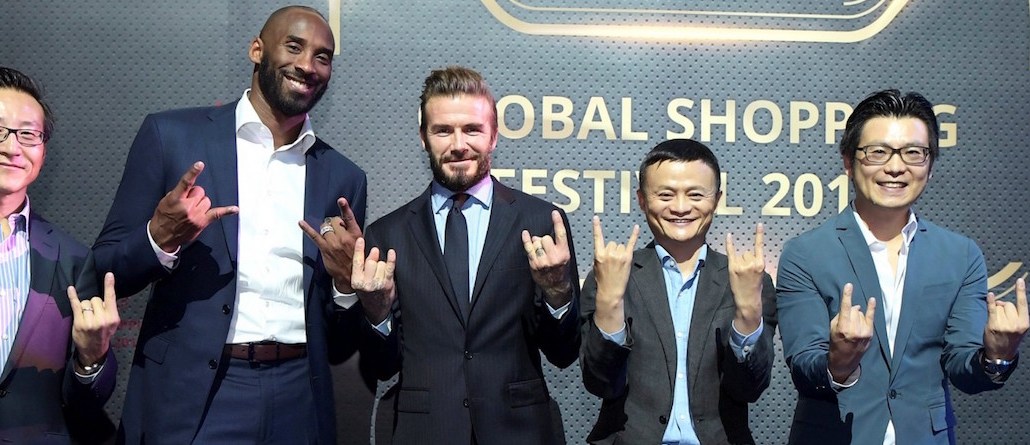Secure your place at the Digiday Media Buying Summit in Nashville, March 2-4
$17 billion in one day: How Alibaba turned China’s Singles’ Day into a shopping bonanza

It was a good week for Alibaba. The e-commerce giant in China easily pulled in 120 billion yuan (around $17 billion) in the first 20 hours of Singles’ Day on November 11, its annual shopping extravaganza. This has already surpassed last year’s 91.2 billion yuan — and is more than five times the $3 billion Americans spent online during Cyber Monday in 2015.
Alibaba turned Singles’ Day, a pre-existing holiday that serves as an anti-Valentine’s Day, into a shopping event back in 2009. It is the mother of all PR ploys that plays around with the solitary feeling that the onset of winter can evoke: Nobody to cuddle with? Treat yourself. Alibaba hits sales records on Singles’ Day almost every year.
This year, Alibaba has made its Singles’ Day sale even bigger with new marketing gimmicks, including virtual reality, the see-now-buy-now model and online-to-offline elements.
Here, we break down how Alibaba approached 2016 Singles’ Day in new ways.
Eye on the global market
More than 14,000 foreign merchants participated in Singles’ Day on Alibaba-owned online stores Tmall and Taobao this year. Combined, they accounted for more than 30 percent of the company’s overall Single’s Day sales, according to the company. First-timers include Shanghai Disneyland, Burberry, Sephora, Target, Maserati, Apple and Victoria’s Secret.
Meanwhile, Alibaba opened the event to consumers in Taiwan and Hong Kong for the first time, and plans to bring Singles’ Day to Southeast Asia next year.
Our Countdown #Double11 Gala has begun! A couple of special guests stopped by to help kick off the show. #DavidBeckham and @victoriabeckham pic.twitter.com/S8TOz3RYlP
— Alibaba Group (@AlibabaGroup) November 10, 2016
Alibaba also assembled a gala for Singles’ Day featuring celebrities like Kobe Bryant, Scarlett Johansson, David Beckham and Victoria Beckham (who has a store on Tmall) to make it feel like more of a global shopping event.
“This is not just about brands from all over the world selling things to China, and it’s also about Chinese companies selling their products to consumers all over the world,” said Mike Evans, Alibaba president, in his interview with Bloomberg.
Alibaba President Mike Evans tells @emilychangtv the company processed #SinglesDay orders at 170,000 a second https://t.co/P4dECbH2wA pic.twitter.com/FWfzgC8mxa
— Bloomberg TV (@BloombergTV) November 11, 2016
Mark Tanner, managing director for Shanghai-based agency China Skinny, also observed that this year’s event was more focused on the ability to buy “exciting global brands.” Deep discounts were rarer this year.
“This is much more sustainable for vendors and will be great if they can pull it off,” he said. “But Alibaba may struggle to have the same huge discounts to lure Chinese consumers in the future.”
New marketing ploys
Alibaba experimented with new ways this year for consumers to interact with brands this year, including through augmented reality, virtual reality, and live streaming. “All sorts of different ways we haven’t yet tried in the past,” said Evans.

A week before Singles’ Day, Alibaba live streamed an eight-hour fashion show in Shanghai with 80 international brands. During the show, viewers could pre-order the designs from luxury fashion houses like Burberry that they saw on the catwalk. The company also developed a Pokémon Go-like mobile game where players could catch different branded “Tmall Cat” mascots and then redeem them for prizes and discounts.
As part of Alibaba’s “Buy+ VR” plan, consumers could either wear a VR headset or a VR cardboard (similar to Google Cardboard but only costs around 15 cents) and make a purchase by staring at a floating “Buy” button in the VR environment.
It’s unclear how much Singles’ Day sales actually came from Alibaba’s AR and VR initiatives, though. Alibaba has yet to break out the numbers. But the buzz was good branding, said observers.
“Alibaba incorporated many ‘buzz’ channels this year. They are ensuring 11/11 continues being exciting for consumers who crave for new things every year,” said Tanner.

Bridging the gap between online and offline
Singles’ Day offers didn’t only take place online but also offline. Taobao and Tmall sent out many digital coupons on Singles’ Day, and those coupons were valid for purchases at participating brands’ physical stores as well.
For instance, on WeChat, Uniqlo offered select designs at 50 percent off both on Tmall and in-store. Some of the offers are still available after Singles’ Day.
While this is a clever tactic for driving in-store traffic, Denise Sabet, managing director for China-focused agency Labbrand, points out that some brands not affiliated with Alibaba, Tmall or Taobao may take advantage of the buzz and offer their own in-store Singles’ Day deals.
“It may be an attempt for brands to capture more of the Singles’ Day traffic for themselves instead of only through the e-commerce giant’s platforms,” said Sabet. “They are basically piggy-backing on the buzz and cultural relevance of Singles’ Day to build their own brands.”
More in Media

From feeds to streets: How mega influencer Haley Baylee is diversifying beyond platform algorithms
Kalil is partnering with LinkNYC to take her social media content into the real world and the streets of NYC.

‘A brand trip’: How the creator economy showed up at this year’s Super Bowl
Super Bowl 2026 had more on-the-ground brand activations and creator participation than ever, showcasing how it’s become a massive IRL moment for the creator economy.

Media Briefing: Turning scraped content into paid assets — Amazon and Microsoft build AI marketplaces
Amazon plans an AI content marketplace to join Microsoft’s efforts and pay publishers — but it relies on AI com stop scraping for free.








